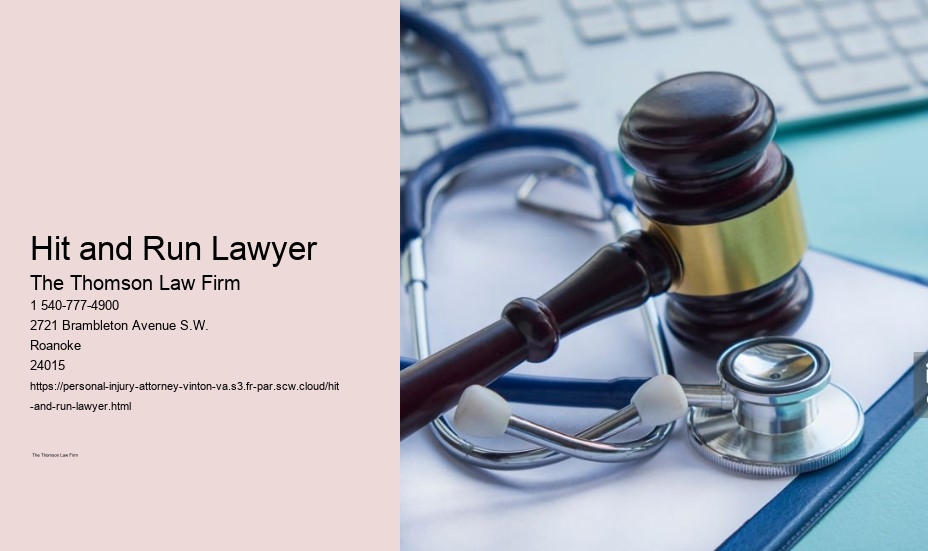

Finally, damages refer to the actual harm or injury suffered by the plaintiff. This can include physical injuries, emotional distress, and financial losses such as medical expenses and lost wages.
Common Types of Personal Injury Cases
Personal injury cases come in various forms. Read about the best Hit and Run Lawyer in Vinton, VA. Wrongful Death Attorney Some of the most common include car accidents, medical malpractice, slip and fall accidents, and product liability cases. Each type has unique aspects but shares the common requirement of proving negligence.
Car Accidents
Car accidents are a leading cause of personal injury claims. Victims must show that the other driver was negligent, such as by speeding, driving under the influence, or disregarding traffic signals.
Medical Malpractice
Medical malpractice occurs when healthcare professionals fail to provide the standard of care, resulting in injury or death. Proving negligence here often requires expert testimony to establish what the standard of care should have been.
Slip and Fall Accidents
Property owners have a duty to maintain safe premises. Slip and fall cases involve proving that the owner knew or should have known about the hazardous condition and failed to address it.
Product Liability
Manufacturers and sellers can be held liable for injuries caused by defective products. Plaintiffs must prove the product was unreasonably dangerous and that the defect caused their injury.
Gathering Evidence to Prove Negligence
Proving negligence requires robust evidence. This includes physical evidence from the accident scene, witness testimonies, expert opinions, and medical records documenting the injuries.
Physical Evidence
Physical evidence can include photos of the accident scene, damaged property, and anything else that can visually support the claim. This helps create a clear picture of what happened.
Witness Testimonies
Witnesses can provide crucial information about how the incident occurred. Their statements can corroborate the plaintiff's account and add credibility to the claim.
Expert Witnesses
Expert witnesses, such as accident reconstruction specialists or medical professionals, can offer insights that laypersons cannot. Their expertise can be pivotal in proving negligence.
Medical Records
Medical records document the extent of injuries and the necessary treatment. They serve as vital evidence to establish the severity of the harm suffered.
Challenges in Proving Negligence
Proving negligence isn't always straightforward. Various challenges can arise, such as dealing with comparative or contributory negligence claims and adhering to the statute of limitations.
Comparative Negligence
In some cases, both parties may share fault. Comparative negligence assesses the degree of fault for each party and reduces the compensation accordingly.
Contributory Negligence
Contributory negligence is more stringent. If the plaintiff is found to be even slightly at fault, they may be barred from recovering any damages.
Statute of Limitations
The statute of limitations sets a deadline for filing a personal injury lawsuit. Missing this deadline can result in the case being dismissed, regardless of its merits.
The Role of a Personal Injury Lawyer
Navigating a personal injury case can be complex, which is why having a skilled lawyer is invaluable. They offer legal expertise, negotiate with insurance companies, and represent clients in court.
Legal Expertise and Guidance
Personal injury lawyers understand the nuances of the law and can provide guidance on the best course of action. They help clients understand their rights and the potential outcomes of their case.
Negotiating with Insurance Companies
Insurance companies often aim to minimize payouts. A lawyer can negotiate on behalf of the client to ensure a fair settlement is reached.
Representing Clients in Court
If a case goes to trial, a personal injury lawyer will represent the client, presenting evidence and making arguments to support the claim. Liability Lawyer Their expertise can significantly impact the case's outcome.
Case Studies
Examining past personal injury cases can provide valuable insights. These case studies highlight successful strategies and common pitfalls.
Landmark Personal Injury Cases
Landmark cases set precedents that influence future personal injury claims. Analyzing these cases helps understand how legal principles are applied in practice.
Lessons Learned from Case Studies
Case studies offer lessons on what works and what doesn’t in proving negligence. They can guide future plaintiffs and lawyers in building stronger cases.
Conclusion
Proving negligence in personal injury cases is a multifaceted process that requires thorough evidence and a deep understanding of legal principles. With the right approach and legal support, victims can navigate the complexities of the legal system and secure the compensation they deserve. If you ever find yourself in such a situation, remember that a knowledgeable personal injury lawyer can be your greatest ally in seeking justice.
The Impact of Personal Injury on Your Life and How an Attorney Can Help
Introduction
Life is unpredictable, and sometimes, it throws curveballs in the form of personal injuries. These injuries can have a profound impact on your life, affecting not just your physical health but also your emotional well-being and financial stability. In such challenging times, a personal injury attorney can be your guiding light, helping you navigate the complex legal landscape and secure the compensation you deserve.
Understanding Personal Injury
What is Personal Injury?
Personal injury refers to any harm caused to an individual due to someone else's negligence or intentional actions. It encompasses a wide range of incidents, from car accidents to medical malpractice, each with its unique set of circumstances and consequences.
Common Types of Personal Injuries
Car Accidents
Car accidents are one of the most common causes of personal injuries. They can lead to severe physical injuries, emotional trauma, and significant financial losses. Whether it's a minor fender-bender or a major collision, the aftermath can be overwhelming.
Workplace Injuries
Injuries at the workplace can occur in various forms, from slips and falls to more severe incidents involving heavy machinery. These injuries not only affect your health but can also jeopardize your livelihood.
Slip and Fall
Slip and fall accidents can happen anywhere, from grocery stores to private properties. These accidents can result in broken bones, head injuries, and other serious conditions that require extensive medical treatment.
Immediate Consequences of Personal Injury
Physical Impact
The physical impact of a personal injury is often immediate and can range from minor cuts and bruises to severe injuries such as fractures, spinal damage, or traumatic brain injuries. These injuries can significantly disrupt your daily life and require immediate medical attention.
Emotional and Psychological Impact
Beyond the physical harm, personal injuries can take a toll on your mental health. The trauma from the incident, coupled with the stress of dealing with medical treatments and financial burdens, can lead to anxiety, depression, and post-traumatic stress disorder (PTSD).
Financial Strain
Personal injuries often come with hefty medical bills, rehabilitation costs, and other expenses. If you're unable to work due to your injury, the financial strain can become even more pronounced, making it difficult to make ends meet.
Long-Term Effects of Personal Injury
Chronic Pain and Disabilities
Some injuries lead to chronic pain or permanent disabilities, affecting your ability to perform daily activities or continue in your chosen career. This can drastically alter your quality of life and require ongoing medical care.
Ongoing Medical Treatments
Long-term injuries often necessitate continuous medical treatments, including surgeries, physical therapy, and regular doctor visits.
Career and Lifestyle Changes
A serious injury might force you to change your career path or make significant lifestyle adjustments. You may need to find a new job that accommodates your physical limitations or adapt your daily routines to manage your condition.
The Role of a Personal Injury Attorney
Legal Advice and Guidance
Navigating the legal system can be daunting, especially when you're recovering from an injury. A personal injury attorney provides the legal expertise and guidance you need to understand your rights and options.

Handling Insurance Companies
Dealing with insurance companies can be challenging. They often aim to minimize payouts, leaving you with insufficient compensation. An attorney can negotiate with insurance companies on your behalf to ensure you receive a fair settlement.
Gathering Evidence and Building a Case
A successful personal injury claim requires solid evidence. An attorney will gather all necessary documentation, such as medical records, accident reports, and witness statements, to build a strong case for you.
How an Attorney Can Help You Recover Compensation
Medical Expenses
Medical bills can pile up quickly after an injury. An attorney will help you recover compensation for all medical expenses, including hospital stays, surgeries, medications, and rehabilitation.
Lost Wages
If your injury prevents you from working, you may be entitled to compensation for lost wages. This includes not only your current lost income but also potential future earnings if your ability to work is permanently affected.
Pain and Suffering
Beyond the tangible costs, personal injuries can cause significant pain and suffering. An attorney will help you quantify these non-economic damages and seek appropriate compensation.
Finding the Right Personal Injury Attorney
Experience and Expertise
When choosing a personal injury attorney, it's crucial to consider their experience and expertise in handling similar cases. An attorney with a proven track record can significantly improve your chances of a favorable outcome.
Client Reviews and Testimonials
Reviews and testimonials from previous clients can provide valuable insights into an attorney's effectiveness and reliability. Look for attorneys with positive feedback and high client satisfaction.
Consultation and Fees
Many personal injury attorneys offer free initial consultations. This allows you to discuss your case and understand their approach without any financial commitment. Additionally, most work on a contingency fee basis, meaning they only get paid if you win your case.
Conclusion
Personal injuries can have a lasting impact on your life, but you don't have to face the challenges alone. A skilled personal injury attorney can help you navigate the complexities of the legal system, negotiate with insurance companies, and secure the compensation you need to move forward. Legal Advice By understanding your rights and seeking professional legal assistance, you can focus on your recovery and rebuild your life after a personal injury.
Understanding Statutes of Limitations in Personal Injury Cases
Introduction
Understanding statutes of limitations is crucial for anyone involved in a personal injury case. These laws set the maximum time after an event within which legal proceedings may be initiated. For those dealing with the aftermath of an injury, knowing these deadlines can make the difference between securing compensation and losing the right to sue.
What are Statutes of Limitations?
Statutes of limitations are laws enacted to set the time limit within which you can bring a lawsuit. They serve to ensure that cases are brought forward within a reasonable time, allowing for the preservation of evidence and the integrity of witness testimony.
The Importance of Statutes of Limitations in Personal Injury Cases
Statutes of limitations are vital for several reasons. They protect defendants from the perpetual threat of litigation and encourage plaintiffs to pursue their claims diligently. Timely claims also help ensure that evidence is fresh and reliable, promoting fair outcomes.
General Time Frames for Personal Injury Statutes of Limitations
The time limits for filing personal injury lawsuits vary significantly by jurisdiction. Commonly, these time frames range from one to six years. It's essential to check the specific laws in your state or consult with a legal professional to understand the applicable deadlines.
Factors Affecting Statutes of Limitations
Several factors can influence the statutes of limitations in personal injury cases. The type of injury and when the harm was discovered can play significant roles. Tort Law For example, some injuries may not be immediately apparent, which can affect the starting point of the limitation period.
Exceptions to the Statutes of Limitations
There are notable exceptions to the general rules of statutes of limitations. Cases involving minors often have extended deadlines, recognizing that children might not have the capacity to file a lawsuit. Similarly, if fraud or intentional concealment by the defendant is proven, the statute may be tolled or extended.
Tolling of Statutes of Limitations
Tolling refers to the legal suspension or delay of the statute of limitations. Various situations can trigger tolling, such as the plaintiff being a minor, mentally incapacitated, or out of the state. Tolling effectively pauses the countdown, allowing more time to file a lawsuit.
Impact of Statutes of Limitations on Your Case
Missing the deadline set by the statute of limitations can have severe consequences. Generally, courts will dismiss cases filed after the deadline, barring the plaintiff from recovering any damages. Hence, it's crucial to seek legal advice promptly to ensure compliance with these deadlines.
How to Determine the Statute of Limitations for Your Case
To determine the statute of limitations for your specific case, consulting with a lawyer is the best course of action. They can provide tailored advice based on the details of your situation and the relevant state laws. Additionally, researching state-specific laws can offer general guidance.
State-Specific Statutes of Limitations
Statutes of limitations can vary widely from state to state. For example, in California, the statute of limitations for personal injury cases is typically two years, while in Maine, it can be up to six years. Accessing accurate information through state legal resources or consulting with an attorney is essential.
Federal Statutes of Limitations
In some instances, federal statutes of limitations may apply, especially in cases involving federal law or agencies. For example, personal injury claims against the federal government often fall under the Federal Tort Claims Act, which has its own specific deadlines.
Statutes of Limitations in Medical Malpractice Cases
Medical malpractice cases have their own unique considerations regarding statutes of limitations. Often, these cases involve shorter deadlines, typically ranging from one to three years, with some states allowing extensions based on the discovery rule.
Statutes of Limitations in Product Liability Cases
Product liability cases, where injuries result from defective products, also face unique statute of limitations challenges. These cases often require adherence to specific deadlines that may differ from general personal injury statutes, typically ranging from two to ten years.
Case Studies
Examining real-life case studies can provide valuable insights into how statutes of limitations impact personal injury claims. For instance, in a case where a plaintiff missed the filing deadline by just a few days, the court dismissed the case, underscoring the importance of timely action.
Conclusion


In conclusion, understanding and adhering to statutes of limitations in personal injury cases is crucial. These laws ensure that claims are brought forward promptly, preserving the integrity of evidence and protecting the rights of all parties involved.
Why Timing is Crucial in Personal Injury Claims
Introduction
When it comes to personal injury claims, timing isn't just important—it's crucial. Whether you've slipped in a store, been in a car accident, or suffered an injury at work, how quickly you act can significantly affect the outcome of your claim. But why is timing so critical? Let’s dive into the intricacies of personal injury claims and uncover why acting swiftly is in your best interest.
Understanding Personal Injury Claims
What is a Personal Injury Claim?
A personal injury claim is a legal case initiated by someone who has been injured due to another party's negligence. The aim is to receive compensation for medical bills, lost wages, and other damages.
Common Types of Personal Injury Claims
Personal injury claims can stem from various incidents, including car accidents, slip and fall incidents, workplace injuries, medical malpractice, and product liability cases. Each type has its unique considerations, but the underlying principle remains the same: proving the other party's negligence.
The Role of Timing in Personal Injury Claims
Statute of Limitations
One of the most critical timing aspects is the statute of limitations, which varies by state and the type of claim. This legal deadline dictates how long you have to file a claim. Missing this deadline usually means losing the right to sue.
Gathering Evidence
The sooner you start gathering evidence, the better. Over time, physical evidence can be lost, and memories can fade. Acting quickly helps ensure that all relevant information is preserved.
Medical Treatment Timeline
Immediate medical treatment not only ensures your health but also creates a medical record linking the injury to the incident. Delays can lead to questions about the cause and severity of your injuries, complicating your claim.
Steps to Take Immediately After an Injury
Seek Medical Attention
Your health should be your top priority. Even if you think your injuries are minor, getting a medical evaluation is essential. This also provides documentation for your claim.
Report the Incident
Whether it’s notifying your employer, filing a police report, or informing a property owner, make sure to officially report the incident as soon as possible. This creates an official record of the event.
Document Everything
Keep detailed records of everything related to the incident and your injuries. This includes photos, witness contact information, medical records, and any correspondence with insurance companies.
How Delays Can Impact Your Claim
Loss of Evidence
Evidence can disappear over time. Surveillance footage might be overwritten, accident scenes can change, and physical evidence can degrade. Quick action helps preserve this crucial information.
Witness Availability
Witnesses are more likely to remember details and be available to testify soon after the incident. Over time, their memories can fade, or they may become unreachable.
Legal and Financial Ramifications
Delays can lead to increased financial stress due to mounting medical bills and lost wages. Legally, it can weaken your negotiating position, making it harder to reach a favorable settlement.
The Benefits of Prompt Action
Stronger Case
Acting quickly helps build a stronger case with ample evidence and timely documentation. Insurance Dispute Lawyer This can significantly influence the outcome of your claim.
Better Negotiation Power
With a well-documented case, you have better leverage during settlement negotiations. Insurers are more likely to offer a fair settlement if they see you’re prepared.
Peace of Mind
Knowing that you’ve taken the necessary steps to protect your rights can provide peace of mind. It allows you to focus on recovery without the added stress of a prolonged legal battle.
Working with Legal Professionals
Choosing the Right Lawyer
Not all lawyers are created equal. Look for a personal injury lawyer with a proven track record and experience in cases similar to yours.
Initial Consultation
Most personal injury lawyers offer a free initial consultation. Use this opportunity to discuss your case, understand your options, and determine if the lawyer is a good fit for you.
Developing a Strategy
Your lawyer will help you develop a strategy tailored to your case. This includes gathering evidence, negotiating with insurers, and preparing for possible litigation.
Common Mistakes to Avoid
Ignoring Medical Advice
Failing to follow medical advice can harm your health and your claim. Insurers may argue that you aren’t as injured as you claim if you don’t follow prescribed treatments.
Posting on Social Media
Be cautious about what you share on social media. Insurers and opposing lawyers can use your posts against you, arguing that your injuries are not as severe as claimed.
Settling Too Quickly

A personal injury attorney is a legal professional who provides representation to individuals who have been injured physically or psychologically due to the negligence or wrongdoing of another party. These attorneys specialize in tort law, which covers civil wrongs and damages.
Yes, hiring a personal injury attorney is often worth it. An attorney's expertise can lead to a higher settlement than you might achieve on your own. They handle the legalities, negotiate with insurance companies, and ensure your rights are protected throughout the process.
Yes, personal injury attorneys at Thomson Law Firm handle medical malpractice cases. If you have been harmed due to a healthcare provider's negligence, we can help you pursue a claim for compensation.
Communication frequency can vary, but a good personal injury attorney should provide regular updates on your case's progress. At Thomson Law Firm, we believe in keeping our clients informed and are always available to answer questions and address concerns.
To find a good personal injury attorney in Vinton, VA, seek recommendations from friends, family, or online reviews. Research attorneys' backgrounds, check their credentials, and schedule consultations to discuss your case and gauge their suitability for your needs.